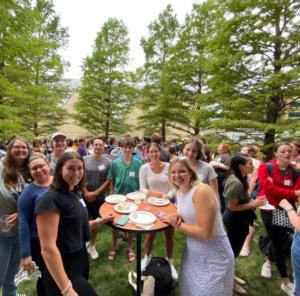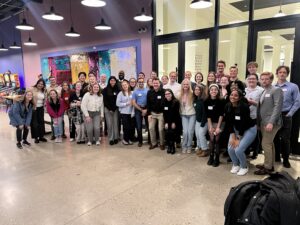We All Work in Student Affairs
This is the sixth in a continuing weekly series of blog posts about the work of Marquette Law School’s Office of Student Affairs. The first, second, third, fourth, and fifth can be found at the included links.
The work and responsibilities of a student affairs team look different from university to university and even from law school to law school. Each is organized in a way that makes sense for a particular student body, curriculum, and school.
At Marquette Law School, the Office Student Affairs is responsible for, among other things, orientation programming, the Academic Success Program, registrar services, student organizations, wellness initiatives, disability services, social media, exam administration, and graduation planning; in other words, we cover ground from orientation to graduation. (Dean Kearney’s opening post to this series introduces you to the members of the office—including, well, me—who do this work, along with Associate Dean Nadelle Grossman, who oversees academic affairs and, as my boss, ultimately our whole operation.) Supporting students as they pursue a legal education is at the heart of what we do.
And, in this regard, we are hardly the only ones within Eckstein Hall to do so. So allow me to break from our “regular programming” to note the collaborative work of a number of colleagues—individuals and teams—all of whom support students in their challenges, work, and pursuits. That is to say, their work also directly involves our students’ affairs.
As her title alone implies, Associate Dean for Enrollment and Inclusion and Professor of Law Vada Waters Lindsey wears a seemingly endless array of hats—from overseeing our admissions process to serving as a tax law professor. She leads our inclusion work and also serves as chair of the faculty’s Diversity Committee. In this regard (or these regards) Dean Lindsey holds regular weekly office hours for all interested students, she invites them to have conversations about what they’re experiencing and learning, she listens, and she shares. She is a trusted collaborator and advisor to colleagues and students alike.
As for where to go next, there are a lot of possibilities. The Academic Success Program has a special place in my heart, but it’s not the only place where our students receive skill-building support—far from it. Director of Bar Preparation Katie Pagel and Writing Specialist Darek Ciemniewski (or “Dr. C,” as he is known to our students) stand at the ready to provide students with the individualized tools they need to succeed on everything from a first-year legal-writing assignment to a post-graduation bar exam for students who do not intend to practice in Wisconsin. Whenever I talk with a student who is taking one of Professor Pagel’s classes or working with Dr. C, there is never a shortage of praiseworthy adjectives used to describe the experience.
Keeping with colleagues who meet, as a matter of course and dedication, one-on-one with each of their students, it makes sense to turn next to the Law School’s esteemed Legal Writing Faculty. Each professor of legal writing brings a different style to the classroom, but all offer their students an education in one of the most important skills acquired in law school. In addition to their classroom instruction, they review drafts of students’ work, meet regularly for conferences with individual students, and get to know our students in a particularly close way. They are also often colleagues who notice and reach out when something is wrong, if someone has stopped showing up, or (it’s not all bad) if someone has shown great strides in his or her work.
The teaching librarians and staff of the Eckstein Law Library are a constant, student-focused presence in Eckstein Hall. Our library has no walls, after all. What this means is, among other things, that students always have a friendly face, right there across the Zilber Forum at the Circulation and Reference desks. You’ll also see members of the knowledgeable Law Library team teaching students core skills in Legal Analysis, Writing, and Research and Advanced Legal Research courses; serving as helpful, calming proctors for 1L final exams; and—if you venture across campus—you might even catch some of them at the Marquette Annex, bowling for their—our—winning team, Split Decisions.
When you need to find a lost computer file, when you cannot hear what presenters are saying in the Lubar Center, when a professor needs help setting up a recording, or—prepare yourself for this one—when your computer dies in the middle of an exam, who you gonna call? Why, the Law School’s Media and Technology Group, of course. Located in suite 218, this three-person team doesn’t just fix our tech problems. They also keep things running smoothly in the first place—things that I don’t quite understand and am all the more grateful to the Media and Tech team for not having to.
Marquette Law School’s nationally acclaimed Sports Law Program is more than a series of stellar courses, internships, events, and conferences. It’s a close and caring network of which participating students instantly become a part. The program’s invested leadership, faculty, and alumni help develop Marquette law students into future leaders in the field. But one of the most impressive things about the Sports Law Program is the way that students support and help develop other students. As it happens here, students, too, are in students’ affairs.
Much like the Office of Student Affairs, the Career Planning Center (CPC) and the Office of Public Service (OPS) both have their own programmatic initiatives and services. At our best, the Law School’s various administrative offices act as limbs of the same body, referring students appropriately or making a handoff when the other limb can help a student. It happens often that I talk with a student about deploying (or perhaps I should say employing) the services of the CPC or boosting her confidence in her professional skills by participating in a Marquette Volunteer Legal Clinic hosted by OPS.
It might be easy to think that magical elves keep our building humming, the Student Success Program sandwiches coming, and the Zilber Forum configured and reconfigured again in a matter of minutes for various large-scale events. But the Law School’s facilities and events team and the Tory Hill Café’s catering team are behind much of it. This past Friday, I ran into a couple of students who asked if they could still come into Eckstein Hall to study over the weekend, despite there being an admissions event planned. I said, “Of course, this is your law school.” And as I reflect on that moment now, our students’ law school is a place where they want to be not least because of our law school’s facilities team.
Even our “centers,” which might be understood as substantially external facing, are deeply involved in student life. Barely 14 months ago, Dean Kearney welcomed former City of Milwaukee Municipal Court Presiding Judge Derek Mosley, L’95, back to the Law School, as director of the Lubar Center for Public Policy Research and Civic Education. And former Milwaukee County Circuit Court Chief Judge Mary Triggiano took on the role of director of the Andrew Center for Restorative Justice at just the beginning of this academic year. Each, together with center colleagues, has infused joy, energy, and a wealth of community knowledge into the Law School. Each already is a force in the lives of our students, welcoming them to our Milwaukee community and introducing them to new people, stories, and skills.
I have saved for last an inclusive mention of all of our caring faculty members. Whether full-time or part-time, whether teaching doctrine or focusing on skills, these are the individuals with whom our students spend the most time. But even setting aside the classroom, it’s not at all uncommon to find a faculty member taking the time to attend a student organization’s event, stopping to talk with a table of students in the Zilber Forum, checking up on a student after something has or may have happened, and, yes, letting others know when they believe a student can use a resource or assistance. Those are among the moments and kindnesses that often stick with our graduates, long after they have moved on from Eckstein Hall.
None of us can (or would want to) do the work of supporting students alone. As I hope is plain to see, at Marquette Law School, in one way, or another, we are all concerned with and dedicated to our students’ affairs. As someone who works in the Law School’s Office of Student Affairs, I’m so grateful to be a part of a community where that is the case.


